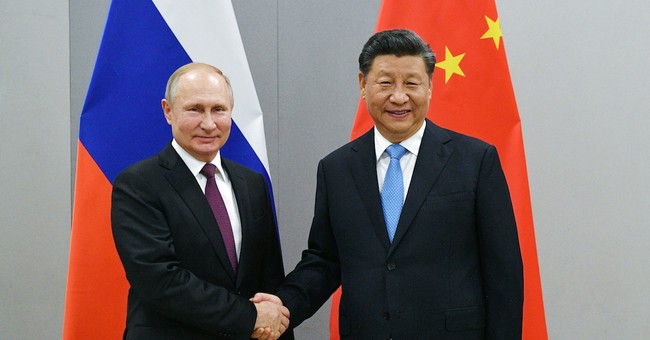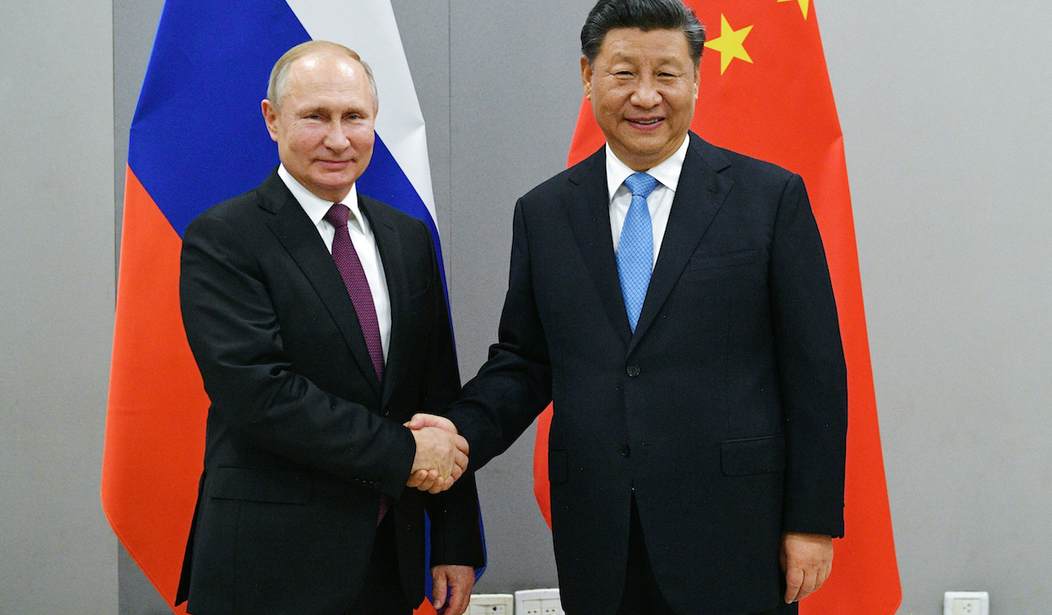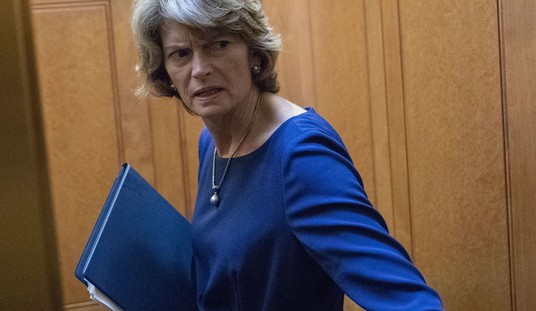
Russian President Vladimir Putin, left, and China’s President Xi Jinping shake hands prior to their talks on the sideline of the 11th edition of the BRICS Summit, in Brasilia, Brazil, Wednesday, Nov. 13, 2019.The BRICS Summit, gathering the leaders of Brazil, Russia, India, China and South Africa, will take place in Brasilia Nov. 13-14. (Ramil Sitdikov, Sputnik, Kremlin Pool Photo via AP)
Long before the coronavirus crisis, Americans were concerned about China’s control over the U.S. drug supply. The Department of Defense “has long raised red flags about such dominance being a national security concern.” Yet, the flow of cheap, generic pharmaceuticals and medical equipment continued to flow to the U.S. from China.
According to Yanzhong Huang, a senior fellow for global health at the Council on Foreign Relations, Chinese pharmaceutical companies supply “between 80 percent and 90 percent of U.S. antibiotics, 70 percent of acetaminophen and about 40 percent of heparin.”
Additionally, the majority of the key ingredients and raw materials used to manufacture essential drugs are supplied by China.
Rosemary Gibson, the author of a book about America’s dependence upon China for the majority of our pharmaceuticals entitled “China Rx,” spoke to NBC News. She said, “If China shuts the door on exports of medicines and their key ingredients and raw materials, U.S. hospitals and military hospitals and clinics would cease to function within months, if not days.” She added, they “could potentially weaponize our medicines. They can sell us medicines without any medicine in them. They can sell medicines that have lethal contaminants in it.”
Gibson said that the U.S. no longer even makes penicillin. “The last penicillin plant in the United States closed in 2004.”
In addition to antibiotics, Gibson noted that China manufactures the key ingredients used in “generic drugs for blood pressure, Alzheimer’s, Parkinson’s, epilepsy and depression.”
Our reliance on Chinese pharmaceutical companies leaves us exposed. The rainy day that we’ve all feared could be near.
This gives China power over us, especially at a time like this. And the Chinese are keenly aware of it.
A recent article published in Xinhua, China’s state-run media agency, threatened to impose export controls so the United States would be “plunged into the mighty sea of coronavirus.”
According to Harry Kazianis, senior director of Korean studies at the Center for the National Interest:
The overreliance on China took hold shortly after the country joined the World Trade Organization (WTO) in the year 2000. Considering the geopolitical and economic challenge the United States faces from an authoritarian China, Beijing now can use its control of the ingredients that make many of the drugs — and entire classes of drugs they make in complete form — as leverage in any dispute with Washington.
As tensions between Washington and Beijing increase, it’s obvious we need to reduce, and ultimately end, our dependency on China, especially for something as critical as pharmaceuticals.
Sen. Tom Cotton (R-AR) and Rep. Mike Gallagher (R-WI) announced a bill on Wednesday designed to achieve this.
The bill will take two years to phase in.
A press release appearing on Sen. Cotton’s website says that, on Thursday, Cotton and Gallagher will introduce the “Protecting our Pharmaceutical Supply Chain from China Act, which would end U.S. dependence on China for pharmaceutical manufacturing. The bill’s key restrictions would go into effect in 2022 and have no impact on the current coronavirus pandemic. No FDA resources will be diverted to begin implementation. Specifically, the bill will:
1. Track active pharmaceutical ingredients through an FDA registry.
2. Prohibit pharmaceutical purchases from China or products with active pharmaceutical ingredients created in China*.
3. Create transparency in the supply chain by instituting a country of origin label of all imported drugs.
4. Provide economic incentives for manufacturing drugs and medical equipment in the United States.
Cotton stated, “The Chinese Communist Party has threatened to cut off America’s access to vital drugs in the midst of a pandemic caused by its own failures. It’s time to pull America’s supply chains for life-saving medicine out of China and make the CCP pay for contributing to this global emergency.”
Gallagher stated, “The Chinese Communist Party’s outrageous threats to withhold lifesaving drugs from the U.S. endangers public health and should open our eyes to our dangerous over-reliance on China in our medical supply chain. This is a national security imperative that to many Americans, is a matter of life and death. It’s past time for us to develop an aggressive plan to move critical pharmaceutical supply chains away from China.”
The Chinese Communist Party has threatened to cut off America's access to vital drugs in the midst of a pandemic caused by its own failures. It's time to pull America's supply chains for life-saving medicine out of China. https://t.co/XrBorsdynQ
— Tom Cotton (@SenTomCotton) March 19, 2020
Told you China would pay. https://t.co/GKFQGWMoW0
— Tom Cotton (@SenTomCotton) March 19, 2020














Join the conversation as a VIP Member